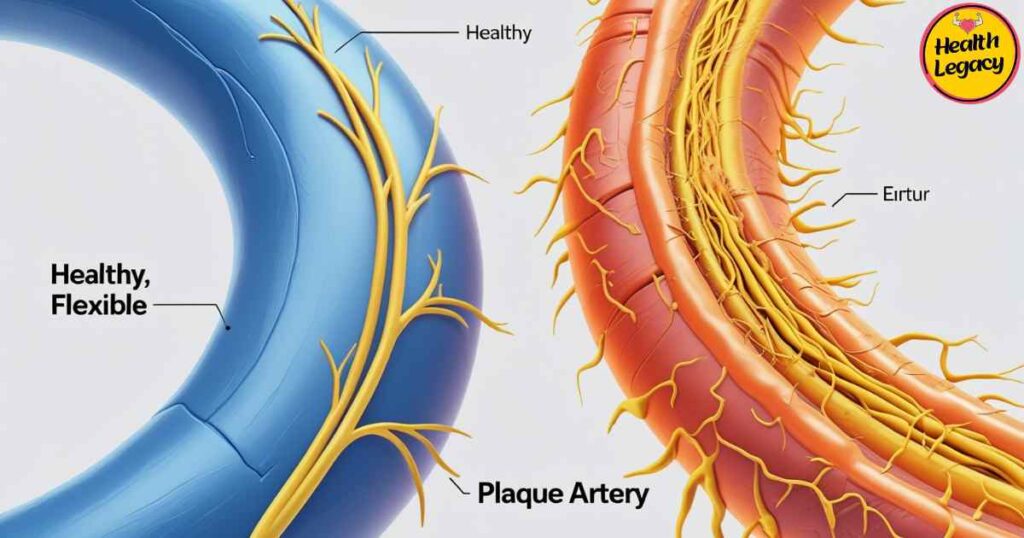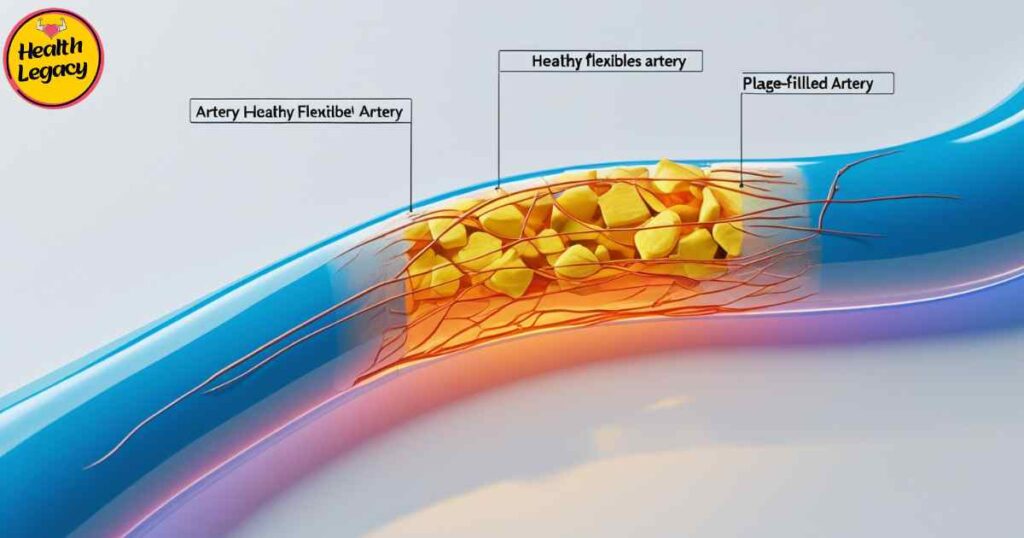Erectile Dysfunction: The Unexpected Warning for Your Heart
Just Imagine you’re strolling through a bustling market, feeling the energy of the crowd, but lately, something’s off in the bedroom. Or maybe you’re hiking in the Rockies, but a nagging issue has you worried. Erectile dysfunction (ED) isn’t just a personal matter—it might be your body waving a red flag about your heart health. Research shows ED (Erectile Dysfunction) can signal heart problems years before other symptoms show up. In this article, we’ll break down the connection between Erectile Dysfunction and heart health, why it happens, and how you can take charge. Let’s dive in with a chatty, over-coffee vibe, keeping things clear for everyone.

What is Erectile Dysfunction?
Erectile dysfunction, or ED, means trouble getting or keeping an erection strong enough for sex. It’s super common—about 30% of men aged 40-70 deal with it, and it gets more frequent with age (Johns Hopkins Medicine). ED can stem from stress or anxiety, but often, it’s tied to physical issues, especially with your blood vessels. Think of it like a warning light on your car’s dashboard—something’s not right under the hood.
Causes of Erectile Dysfunction
- Physical: Poor blood flow, hormonal imbalances, or nerve issues.
- Psychological: Stress, anxiety, or relationship troubles.
- Lifestyle: Smoking, heavy drinking, or lack of exercise.
Also Read : Mindfulness Techniques for Beginners: Your Guide to Calm and Clarity 2025
The Link Between Erectile Dysfunction (ED) and Heart Disease
Here’s the deal: Erectile Dysfunction and heart disease are like cousins with the same bad habits. Studies, like one from the American Heart Association, show men with ED (Erectile Dysfunction) are twice as likely to have a heart attack or stroke. Why? Both conditions are tied to how well your blood vessels work.

Blood Flow and Endothelial Dysfunction
Your blood vessels have a thin lining called the endothelium. When it’s damaged—say, by high cholesterol or diabetes—blood flow suffers. This hits the penis first, causing ED, and later the heart, leading to heart disease. It’s like a pipe getting clogged; the smaller pipes (penile arteries) show problems before the bigger ones (coronary arteries).

Nitric Oxide’s Big Role
Nitric oxide is a superstar molecule that relaxes blood vessels, letting blood flow freely. In the penis, it’s key for erections. In the heart, it keeps blood pressure in check and stops plaque buildup. Low nitric oxide levels? You’re at risk for both ED and heart problems (WebMD). Devanshi Priya, our Health Legacy expert, says boosting nitric oxide through diet—like eating beets or spinach—can make a difference.
Watch this video from our you tube Channel health Legacy TV:
Why ED Shows Up First
Ever wonder why ED often beats heart disease to the punch? It’s all about artery size. Penile arteries are tiny—about 1-2 mm wide—compared to coronary arteries, which are 3-4 mm (Circulation Journal). When plaque builds up, those smaller pipes clog first, causing ED. This can happen 3-5 years before heart issues show up, giving you a window to act.
Also Read : Boost Your Emotional Well-Being with These 10 Mental Health Strategies
A Real-Life Example
Meet Raj, a 50-year-old from Delhi. He’s a busy guy, loves his street food, and hasn’t exercised since college. When ED started, he shrugged it off as stress. But his doctor, knowing the link between ED and cardiovascular health, ran tests. Raj had high blood pressure and early artery blockages. With a better diet and daily walks, he’s now back to his old self, dodging a bigger heart problem. Stories like Raj’s show why paying attention to ED matters.

Risk Factors That Connect ED and Heart Disease
ED and heart disease share a laundry list of troublemakers. Here’s what to watch for:
| Risk Factor | How It Impacts ED and Heart Health |
|---|---|
| Smoking | Damages blood vessels, reducing blood flow to the penis and heart. |
| Obesity | Raises diabetes and hypertension risk, both linked to ED and heart disease. |
| High Cholesterol | Builds plaque in arteries, choking off blood flow. |
| Diabetes | Harms nerves and blood vessels, hitting both sexual and heart health. |
| Hypertension | Strains arteries, making them less flexible for erections and heart function. |
| Sedentary Lifestyle | Worsens all the above, slowing blood flow and piling on weight. |
Tackling these can boost your heart health and get your groove back.

When to See a Doctor
If ED is new or getting worse, don’t wait. It’s especially urgent if you’ve got risk factors for heart disease—think diabetes, smoking, or a family history of heart issues. Your doctor might suggest:
- Blood Tests: To check cholesterol, blood sugar, or testosterone.
- ECG or Stress Test: To spot heart conditions.
- Vascular Scans: To see how blood’s flowing.
Early checks can catch heart problems before they turn serious. Health Legacy’s Devanshi Priya stresses talking openly with your doctor—no shame, just solutions.
Also Read : Top 5 Best home workout routines for beginners, home fitness for newbies.
Treatment and Prevention
Good news: fixing ED often helps your heart health, too. Here’s how to start:

Lifestyle Changes
- Eat Smart: Load up on fruits, veggies, and whole grains. Think of a colorful plate like a Mumbai thali—variety is key (Harvard Health).
- Move More: A 30-minute walk daily, like a stroll through Central Park or along Marine Drive, boosts blood flow.
- Lose Weight: Dropping extra pounds cuts ED and heart disease risk.
- Quit Smoking: It’s tough but worth it for your arteries.
- Limit Alcohol: A glass of wine’s fine, but too much hurts ED and heart health.

Medical Treatments
Medications like sildenafil (Viagra) or tadalafil (Cialis) can help ED by boosting nitric oxide effects. But if you’re on heart medications like nitrates, these can be risky—check with your doctor (NHS). Treating heart conditions like high blood pressure or diabetes can also improve ED.
Also Read :How to manage anxiety naturally-Expert Tips | Health Legacy
Natural Boosts
Some folks try supplements like L-arginine to up nitric oxide levels. They’re not magic pills, but they might help alongside lifestyle changes. Always talk to a doctor first.

John’s Story
Let’s meet John, a 55-year-old from Chicago. He loved his deep-dish pizza but started noticing ED two years ago. Thinking it was just age, he ignored it. His doctor, aware of the ED as heart disease indicator, ordered tests. John had high cholesterol and early artery issues. He swapped pizza for salads, started jogging, and took meds. Now, his ED is better, and he’s dodged a heart attack. John’s story shows how catching ED early can save your heart.

Conclusion
Erectile dysfunction isn’t just about sex—it’s a wake-up call for your heart health. By understanding the link between ED and cardiovascular health, you can take steps to protect yourself. Don’t ignore ED; see a doctor, make lifestyle changes, and keep your heart strong. At Health Legacy, we’re all about helping you live your healthiest life, whether you’re in a busy Indian city or a quiet American town. Your heart powers everything—give it the care it deserves.

FAQs
- Can ED be cured?
Often, yes! ED tied to lifestyle can improve with diet, exercise, or quitting smoking. Medical causes might need meds or other treatments. - Is ED always a sign of heart disease?
Not always. Stress, low testosterone, or meds can cause ED. But its link to heart disease means it’s worth checking out. - What lifestyle changes can help with ED?
A healthy diet, regular exercise, weight loss, and no smoking can work wonders for ED and heart health. - Are there natural remedies for ED?
L-arginine or ginseng might boost nitric oxide, but results vary. Check with a doctor before trying them. - How does age affect ED?
ED is more common as you age, but it’s not inevitable. It’s often tied to heart conditions or other health issues. - Can stress cause ED?
Yup, stress can mess with erections. Relaxation techniques or therapy can help alongside heart-healthy habits. - What are the treatment options for ED?
Options include pills like Viagra, vacuum devices, implants, or lifestyle tweaks. Your doctor can guide you based on your heart health
External Resources
- Mayo Clinic on ED and Heart Disease
- Harvard Health on ED as a Warning Sign
- American Heart Association on ED and Heart Health
- WebMD on Nitric Oxide and ED
- NHS on Erectile Dysfunction
Written by Devanshi Priya, a seasoned health journalist with over 10 years of experience in crafting informative and engaging content for Health Legacy. Her expertise ensures this article is accurate and easy to understand for readers worldwide.
Disclaimer:
This article is for informational purposes only and is not a substitute for professional medical advice, diagnosis, or treatment. Always consult a healthcare professional for personalized guidance regarding erectile dysfunction (ED), heart health, or any medical concerns.




